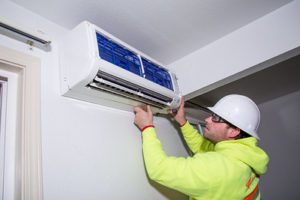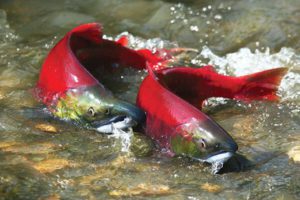Let’s begin with a moment of gratitude. During the whirlwind 60-day 2022 legislative session, you sent over 2,300 messages to lawmakers urging them to be bold, seriously address the climate crisis, and protect our cherished waterways. Thirty-five of you joined us in Zoom meetings with lawmakers to talk about vital bills for salmon, kelp and the climate during Clean & Abundant Water Lobby Week. Thank you!
Especially during a shorter session (every alternate year is only 60 days), there are always important policies left on the cutting room floor. There were some stalwart advocates in the state legislature for policies that would help Washington address climate change planning, protect salmon and move our buildings to clean energy.
But unfortunately the 2022 legislative session also included a number of missed opportunities. Lawmakers did not rise to the occasion on the urgency of climate change and the rapid rate of water and habitat degradation in our growing region. Some important bills were not actually voted down; they did not pass simply because they ran out of time to receive a vote in the face of pushback and stalling from opposing lawmakers.
Still, there are several bills passed worth celebrating — and a budget that lawmakers approved features funding for some important programs.
Securing kelp and eelgrass protection
Kelp forests and eelgrass meadows are crucial to sequestering carbon in marine ecosystems. They also are the foundation of the salmon food chain, supporting resident orcas, herring and vital salmon fisheries. SB 5619 will soon be signed into law, helping the Department of Natural Resources conserve and restore at least 10,000 acres of kelp forests and eelgrass meadows by 2040.
Planning for climate impacts: Key bill failed to pass, but important loophole closed
Right now, many Washington’s communities aren’t planning adequately for the climate change effects we’re already seeing, from sea level rise to floods and wildfires. HB 1099, a comprehensive bill to update our now 32-year-old Growth Management Act, would have ensured that Washington’s largest and fastest-growing communities plan for the reduction of greenhouse gas emissions and vehicle miles traveled. It also would have ensured that all Washington communities build climate resilience by planning for hazards like wildfires, drought, and sea-level rise.
But lawmakers opposed to the bill worked hard to run out the clock, and HB 1099 did not get a vote in time to fully pass, despite passing in both the House and Senate during previous parts of the lawmaking process. We are truly disappointed this happened, but grateful to all of our supporters who sent over 700 messages to your legislators. We will work hard to get improved climate planning passed next year!
On the bright side, a bill (SB 5042) passed that has been in legislative limbo since 2008. It closes a longstanding loophole in the Growth Management Act that used to allow counties to unnecessarily expand urban growth into farmland and natural habitat. That meant that construction permits were sometimes approved and development moved forward before a project could be reviewed and deemed an illegal expansion (not in accordance with the Growth Management Act that’s designed to prevent sprawl and protect vital areas like wetlands — which provide carbon sequestration, water filtration, flood mitigation, and wildlife habitat). Rejoice, for the loophole has been closed!
 Reducing emissions from buildings: Wins and missed opportunities
Reducing emissions from buildings: Wins and missed opportunities
Legislators passed two of the five proposed bills related to weaning our buildings off methane gas — a huge climate pollutant all the way from fracking well to pipeline to gas appliances:
- Expanding clean Building Performance Standards to smaller buildings (SB 5722). Only a small portion of Washington buildings were included in the 2019 Clean Buildings Act. SB 5722 will expand certain requirements of the Clean Buildings Act to smaller commercial (20,000 – 50,000 square feet) and to multifamily buildings (over 20,000 square feet) in order to maximize energy efficiency and resulting climate and health benefits. The bill also prioritizes funding to building owners who create anti-displacement provisions for multifamily tenants.
- “Leading by example”: HB 1280 will require an electrification study in state-owned buildings, encouraging building designers and developers to find cost-effective solutions to transition to all-electric systems.
While these bills are helpful, they do not have the potential to curb climate-heating methane gas nearly as effectively as the other three bills would have. Two of our top priority bills would have created voluntary opportunities for switching off gas. Yet the gas industry, in line with their nationwide effort to greenwash fossil-derived gas as a “clean” fuel, still lobbied against them.
One bill would have allowed publicly owned electric utilities to offer incentives for switching to efficient electric systems off gas (a privilege currently only available to private utilities like PSE). The other would have created a single “reach code” — a set of efficiency standards for new commercial and large residential buildings — that individual cities could adopt to go above and beyond the bare minimums set by the state. It would offer cities a roadmap to stop locking new large buildings into years of fracked gas usage, but was not compulsory.
Good news: wins funded in the budget
Weatherization and solar power
Thankfully, the legislature restored $10 million of funding to the Weatherization Plus Health program. Over 400,000 low-income Washington households need weatherization services. Low-income families often live in homes with high energy bills and frequently cannot afford to address problems like moisture, mold, and dust mites that cause or aggravate respiratory illnesses like asthma and chronic obstructive pulmonary disease. The legislature also granted expenditure authority for $69 million from the federal Infrastructure Investment and Jobs Act.
Great news, because the state had only been reaching one percent of eligible households. This funding will reduce the climate impact of poorly-insulated homes and keep people healthy. Weatherization is crucial to bringing climate justice home (literally) for lower income families.
There’s also $57 million allocated to support building solar power projects!
Transportation
The 16-year transportation package (called Move Ahead Washington) is no small deal: it’s the biggest passed in state history. It will put $7 billion into highway projects and $3 billion for public transit, and add four new hybrid ferries to the state ferry fleet. It will also provide $2.5 billion for fixing fish passage culverts in the state, part of a Supreme Court order that Washington State must uphold Tribal treaty rights and remove road culverts that block fish habitat.
 Salmon recovery
Salmon recovery
Alongside funding for culvert removal, the transportation package also included $500 million over its 16-year funding window to help prevent stormwater pollution, one of the main threats to salmon. It funds stormwater infrastructure that can filter contaminants from urban runoff, such as rain gardens and bioswales. There is about $150 million for voluntary restoration programs, such as creating riverside buffers that provide filtration and keep streams cool.
Looking ahead
It’s always good to remember that solid legislation often takes several attempts to pass. “Building electrification” is a relatively new concept to many lawmakers, and climate change planning bills like HB 1099 were within a hair’s breadth of making it.
Next year, we hope to see additional salmon recovery legislation that supports the state’s economically and culturally vital fisheries.
Make sure you’ve signed up for our Legislative Action emails, where we share weekly updates during each year’s legislative session on key bills, giving you a chance to support them and contact lawmakers at pivotal moments.

 Reducing emissions from buildings: Wins and missed opportunities
Reducing emissions from buildings: Wins and missed opportunities Salmon recovery
Salmon recovery